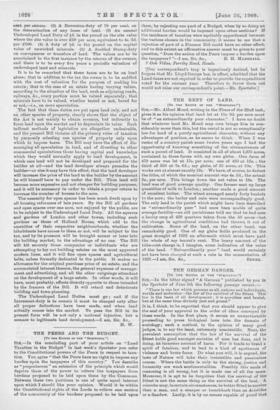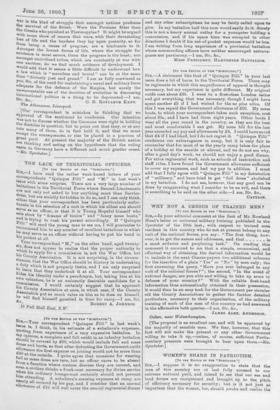THE GERMAN DANGER.
[To errs anrron or viii "sr so r.uroie."1 Sri,—In the letter signed "A German" published by you in the Spectator of June 5th the following passage occurs :— " There is one law which governs us all, nations and individuals, worlds and molecules—the law of the survival of the fittest. This law is the basis of all development: it is merciless and brutal, but at the same time divinely just and grand."
It is, I think, to be regretted that you should appear to give , the soul of your approval to the order of ideas conveyed by these words. In the first place, it seems an unwarrantable proceeding to press biological laws into the domain of sociology; such a method, in the opinion of many good , judges, is, to say the least, extremely unscientific. Neat, the prevalent assumption that the law of the survival of the fittest holds good amongst societies of men has done, and is doing, en immense amount of harm. For it tends to breed a spirit of fatalism, and to lead to a kind of apotheosis of violence and brute force. Do what you will, it is argued, the laws of Nature will take their irresistible and passionless course. Where the battle is only to the strong, justice and humanity are weak sentimentalities. Possibly this mode of
reasoning is all wrong, but it is made use of all the same. Moreover, it is apt to be forgotten that the survival of the fittest is not the same thing us the survival of the best. A microbe may, in certain circumstances, be better fitted to survive than a man, and a sharper or hunchback than an Aristides or a Sandow. Lastly, it is by no means capable of proof that war is the kind of struggle that amongst nations produces the survival of the fittest. Were the Persians fitter than the Greeks who perished at Thermopylae P It might be argued with some show of reason that wars, with their devastating loss of life and the burdens they lay upon posterity, so far from being a cause of progress, are a hindrance to it. Amongst the 'lowest forms of life, where the struggle for existence is most severe, there the progress is the least ; nor amongst uncivilised tribes, which are constantly at war with one another, do we find much evidence of development. I would add that it seems a little difficult to understand bow a law which is " merciless and brutal " can be at the same time "divinely just and grand." I am as fully convinced as you, Sir, of the need for maintaining a naval and military force adequate for the defence of the Empire, but surely the unwarrantable use of the doctrine of evolution in discussing international politics is a thing to be deprecated.—I am, Sir, ate., C. B. ROTLANCE KENT. The Athenaeum, Liverpool. [Our correspondent is mistaken in thinking that we approved of the sentiment he condemns. Our intention was not to discuss whether the Germans were right in holding the doctrine in question, but to point out that they, or at any fate many of them, do in fact bold it, and that we must accept the consequences, or else be placed in a position of great peril. At present the majority of the 13ritish nation are thinking and acting on the hypothesis that the ruling elate in Germany have a different and much gentler creed. Spectator.]



























































 Previous page
Previous page